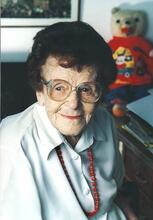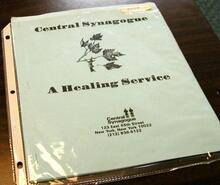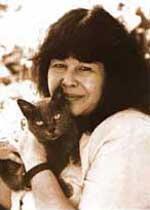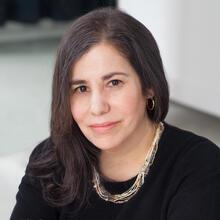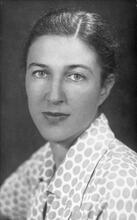Laura Riding
Laura Riding.
Courtesy of Poets.org.
Laura Riding studied at Cornell before marrying history professor Louis Gottschalk. In 1926, a year after their divorce, she published her first poetry collection and moved to England, where she lived with Robert Graves and his family. In 1929 she attempted suicide, Graves abandoned his wife, and Riding and Graves resettled in Majorca, where they ran Seizin Press, published a journal, and collaborated on A Survey of Modern Poetry. In 1941, Riding renounced poetry. After Graves and Riding returned to the United States and separated, Riding married Schuyler Jackson, poetry reviewer for Time magazine. The couple ran a citrus farm in Florida and collaborated on a dictionary until Jackson’s death in 1968, after which Riding returned to writing critical essays and revised her poetry.
Overview
Laura Riding, also known as Laura Riding Jackson or Laura (Riding) Jackson, was an unconventional poet and critic who is credited with helping shape modern poetry. The author of over 30 works (most hers alone, a few written with others), she worked closely with a number of the leading writers of the 1930s and 1940s and later in near isolation. Her career moved from literary circles in New York and London to a modest citrus farm in Florida. Helping to define modern poetry, she gave up writing poetry for a time but later began publishing again after a silence of 30 years. Her poetry—most in blank verse—is intellectual and introspective, often dealing with abstract questions such as the role of the poet in confronting truth.
Riding’s work was never widely read or popular, yet she was an influential figure among other writers and thinkers, exerting, from all accounts, a dynamic, forceful, often eccentric personality. “Few writers have been so highly praised,” writes Elizabeth Friedmann in the preface to her 2005 biography of Riding, A Mannered Grace, “and fiercely damned.” Riding, she says, is “one of our most elusive and puzzling literary figures.” Likewise, Jane Marcus writes, “Riding ought to be restored to the ranks of writers like Hart Crane and Gertrude Stein, where she belongs as a shaper of our speech, a poet of powerful and original irony” (Marcus, p. 298).
Early Life & Family
The poet was born Laura Reichenthal in New York City on January 16, 1901, the daughter of Nathaniel S. and Sarah (Edersheim) Reichenthal. Nathaniel, an immigrant from Austria, had arrived in 1884 and was naturalized in 1890. In 1893, he married Laura Lorber, originally from Hungary. The next year, their daughter Isabel was born, and soon afterwards Laura died of tuberculosis, as did many who worked in the sweatshops. Four years later, Nathaniel married Sarah Edersheim, who lived uptown in a German enclave, Yorkville. Sarah, who went by Sadie, had been born in New York, but her parents were also immigrants. Sadie and Nathan’s first child was named Laura in memory of Nathan’s deceased wife. It is a Jewish tradition that children are named in memory of a deceased relative, but this specific circumstance is rather rare.
Nathaniel was a struggling worker, and the Reichenthals’ life in New York was poor. In 1900, according to that year’s Federal census, the small family was living in Manhattan at 362 E. 52 Street, Nathaniel supporting them with his tailoring work. By 1905 they were living on Van Buren Street in Brooklyn. The Reichenthals also lived at several different locations in between, a peripatetic family, and Laura attended a dozen schools. Despite the seemingly unsettled nature of her early years, Laura was an excellent student and blossomed at Girls’ High School in Brooklyn, winning a scholarship to attend Cornell University in upstate New York. While she began her studies there in 1918, she did not complete her degree, choosing instead to pursue a career as a poet.
Jewish Identity
How important was Judaism to Laura Riding? Minimally, it seems. Her parents were Jewish but not religious. While her first husband, Louis Gottschalk, a Cornell history instructor was Jewish, they were married in a civil ceremony in Ithaca in 1920. Laura moved with him first to Illinois and then to Kentucky as he pursued his academic career. Brilliant, Gottschalk was just two years older than his wife and had his Ph.D. by the time he was 22. But the marriage did not last and they divorced in 1925. Laura Anglicized “Reichenthal” to “Riding” but kept the last name of Gottschalk, under which she published her first two volumes of poetry. Judaism seems to have had little influence on her life, personal or professional, and biographers note her rejection of both Judaism and her father’s socialism. Scholars have also noted her various name changes, accompanying major transition points in her life. Each transition, it seems, also took her further away from her Jewish origins.
Although Riding had many friends and associates who were Jewish, and some, such as Polly Antell Cohen, were quite close and lifelong, the question of religious identity did not affect her life or poetics in any meaningful way. By the end of her life, she seems to have abandoned religion altogether. In 1988, she was admitted to a hospital in Florida and a clerk asked her what religion to put down. “I belong to no church,” was her response. Then she added, “Once when they asked for my religion I said ‘I belong to no church, but I love the universe’” (quoted in Friedmann, 456).
Early Career as a Poet
As a very young woman, Riding decided to pursue a career as a poet, and her early work was first acclaimed by the “Fugitive” writers, a group based in Nashville who wanted Southern literature to refocus on its agrarian roots. She was published in their magazine, as well as in Poetry. After moving back to New York City, Riding lived in a Greenwich Village apartment with her college friend Polly Antell, who was now a lawyer. In the city, her circle included such noted writers as e.e. cummings and Hart Crane.
John Crowe Ransom, editor of The Fugitive, sent some of Laura Riding Gottschalk’s poems to English poet and writer Robert Graves, who began to correspond with her, and then invited her to come to England. She left the United States at the very end of 1925. She was not quite 25 years old and already had a promising future as a poet.
Relationship with Robert Graves
Graves had a wife and four children, and the situation quickly became complicated. In 1929, during an emotionally tumultuous period, Riding attempted suicide by throwing herself out of an upper-story window, breaking her back. This breakdown was the result of her difficult lifestyle. She was lucky, but her recovery was long. Riding biographer Deborah Baker, sees in this Laura’s “complete break with the limitations of older and entrenched poetic traditions” as well as “profound contempt for middle-class values and aristocratic pretensions” (Baker, p. 203).
After Riding’s recovery, she and Graves, who had left his family, settled in Majorca, where they ran the Seizin Press, produced a journal called Epilogue, and collaborated on books including A Survey of Modernist Poetry. Between 1926 and 1938, Riding wrote prolifically and published numerous volumes of poetry. The peak of her career came with the publication of Collected Poems in 1938, and soon afterward she renounced poetry. With the start of the Spanish Civil War, she and Graves fled to the United States; their relationship soon ended. Riding also published numerous essays and short stories under different versions of her name as well as a nom-de-plume, Madeleine Vara. In 1939, she published Lives of Wives, a work of historical fiction. She continued to pursue a variety of types of writing throughout her long career. Her other works of fiction are 14A (1934) and A Trojan Ending (1984).
Retreat from Literary Circles
In 1941, Riding married Schuyler Jackson, poetry reviewer for Time magazine, to whom she had been introduced several years earlier. They then retreated from literary circles. Moving to rural Wabasso, Florida, where they lived without a telephone or electricity (which was not installed until 1989), they raised fruit and pursued independent scholarship in linguistics. In 1943 they visited Laura’s elder half-sister, Isabel Mayers, and her husband Jesse, in Los Angeles. At this time Laura was reunited with her aging and ill mother, who lived with the Mayers; it was the first time in twenty years that she saw her mother. The next year, Laura and Schuyler took Sadie Reichenthal in for several months.
In 1955, Rider and Jackson, who had been ill for years, sold the last of their citrus groves and began a series of trips to the Southwest and to hot springs, finding “the search for the elusive cause of Schuyler’s illness was as persistent and enduring as the search for the meaning of words” (Baker, 418). After Jackson’s death in 1968, Riding continued working on their lexicography project, assisted by a Guggenheim Fellowship awarded in 1973. She finished the book, titling it Rational Meaning: A New Foundation for the Definition of Words (published posthumously by the University Press of Virginia in 1997).
Legacy
Riding continued to write, and there was a resurgence of interest in her work in the 1970s and 1980s, when she published new critical works and revised edition of her poetry. She received a fellowship from the National Endowment for the Arts in 1979 and was awarded Yale’s Bollingen Prize in early 1991 for her lifelong devotion to the art and ideals of poetry.
Laura Riding Jackson died of heart failure in Florida on September 2, 1991. Her simple house in Florida has been preserved by the Laura (Riding) Jackson Foundation.
Laura Riding Jackson’s connection to Judaism was minimal. As f0r her poetry, there is only one on this topic, titled “Jews,” sixteen lines long, of negative imagery:
Hapless and unmysterious they thrive
Like flowers by themselves torn out of earth,
Martyrs and stubborn miracles alive
Upon the spiteful victory of pain.
Though Riding was in Europe in the 1930s and saw Fascism taking hold of Europe, her work does not reflect major events relating to Jewish identity, such as the particular dangers faced by European Jews. She seems not to have been intrigued by any political events for that matter. She was more interested in abstractions such as love and truth, or ancient tales or nature. In her writing as in her lifestyle, she was of a singular mind and a perennial outsider.
Adams, Barbara. The Enemy Self: Poetry and Criticism of Laura Riding. Rochester, NY: University of Rochester Press, 1990.
Annual Obituary, 1991, ed. Deborah Andrews, 1992.
Baker, Deborah. In Extremis: The Life of Laura Riding. New York: Hamish Hamilton, 1993.
Clark, Alan J. “Laura (Riding) Jackson: a revised check-list, March 1923 – January 2001,” 147-179 in The Sufficient Difference: A Centenary Celebration of Laura (Riding) Jackson, 147-179. Chelsea Associates, 2000.
Contemporary Authors, New Revised Series, 28:251-253.
Contemporary Literary Criticism, 373, 377.
Friedmann, Elizabeth. A Mannered Grace: The Life of Laura Riding. New York: Persea, 2005.
Jacobs, Mark. “Laura (Riding) Jackson and Robert Graves: The Question of Collaboration,” Gravesiana, Vo. 3, No. 2, 2010.
Jacobs, Mark. “Re-Writing History, Literally: Laura Riding’s The Close Chaplet,” Gravesiana, Vol. 3, No. 3, 2012.
Marcus, Jane. “Laura Riding Roughshod,” in The Iowa Review Collection of Contemporary Writing by Women, 295-299. New York: Collier Books, 1981.
Nolan, John. “Poetry, Language, Truth-Speaking,” editor’s introduction to The Failure of Poetry, The Promise of Language, by Laura (Riding) Jackson. Ann Arbor, MI: University of Michigan Press, 2007.
Nye, Robert, ed. A Selection of the Poems of Laura Riding. New York: Persea, 1994.
Simpson, Louis. “Review of Robert Graves: The Years With Laura, 1926-40.” New York Times Book Review, November 11, 1990.
Turner, Jenny. “Lauraphobia,” a review of In Extremis: The Life of Laura Riding, by Deborah Baker, London Review of Books, March 10, 1994.
Wallace, Jo-Ann. “Laura Riding,” in The Oxford Companion to Women’s Writing in the United States, edited by Cathy Davidson and Linda Wagner-Martin. London: Oxford, 1995.
Wexler, Joyce. “Laura Riding” in Dictionary of Literary Biography, 48: 236-245.
Wexler, Joyce. Laura Riding: A Bibliography. Garland, 1981.
Wexler, Joyce. Laura Riding’s Pursuit of the Truth. Athens, OH: Ohio University Press, 1979.
Riding papers: Laura and Schuyler B. Jackson Collection, Cornell University; Joint University Libraries, Nashville; Northwestern University; State University of New York, Buffalo.



